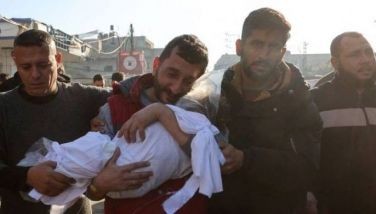US to help Georgia boost its defenses
TBILISI — In the face of growing aggression by Russia, the United States and Georgia moved yesterday to expand their defense relationship — including the possible sale of US Black Hawk helicopters to the former Soviet bloc nation at the crossroads of eastern Europe and Asia.
Defense Secretary Chuck Hagel said Russian President Vladimir Putin's move to annex the Crimea region of Ukraine has further isolated Moscow.
"It has done a tremendous amount to coalesce NATO and Europe to come together recognizing what President Putin's actions have wrought, the danger that that represents to all of Europe," Hagel said during a press conference with Georgia's defense minister.
Ukraine and Russia signed a cease-fire two days ago, but there have been explosions near the airport in Donetsk, raising concerns the agreement may be on the verge of collapse.
Hagel's meetings here come on the heels of the NATO summit in Wales where allies agreed to expand Georgia's role as a NATO partner and reaffirm a longer-term effort to admit the former Soviet republic into the alliance.
The defense minister, Irakli Alasania, said it has been painful for Georgia — which also fought and lost an invasion by Russia in 2008 — to see the world be unable to check Russia's aggression. About 20 percent of Georgia — largely the separatist regions of Abkhazia and South Ossetia — is still occupied by Russia.
But he said Georgia is pleased with NATO's decision last week to make his country an expanded partner, giving it access to more allied support and services.
Hagel said the US and Georgia did not reach a final agreement on the sale of Black Hawks, but they are discussing prices and other details.
At its 2008 summit in Bucharest, Romania, then President George W. Bush and other NATO leaders agreed that Ukraine and Georgia, both former Soviet republics that the Russians consider part of their "near abroad," would one day be admitted to the alliance.
While both countries continue to work toward that goal — which the US supports — there are concerns about Russia's reaction. Some nations have flatly ruled it out, saying it would heighten tensions in the region.
- Latest
- Trending
































